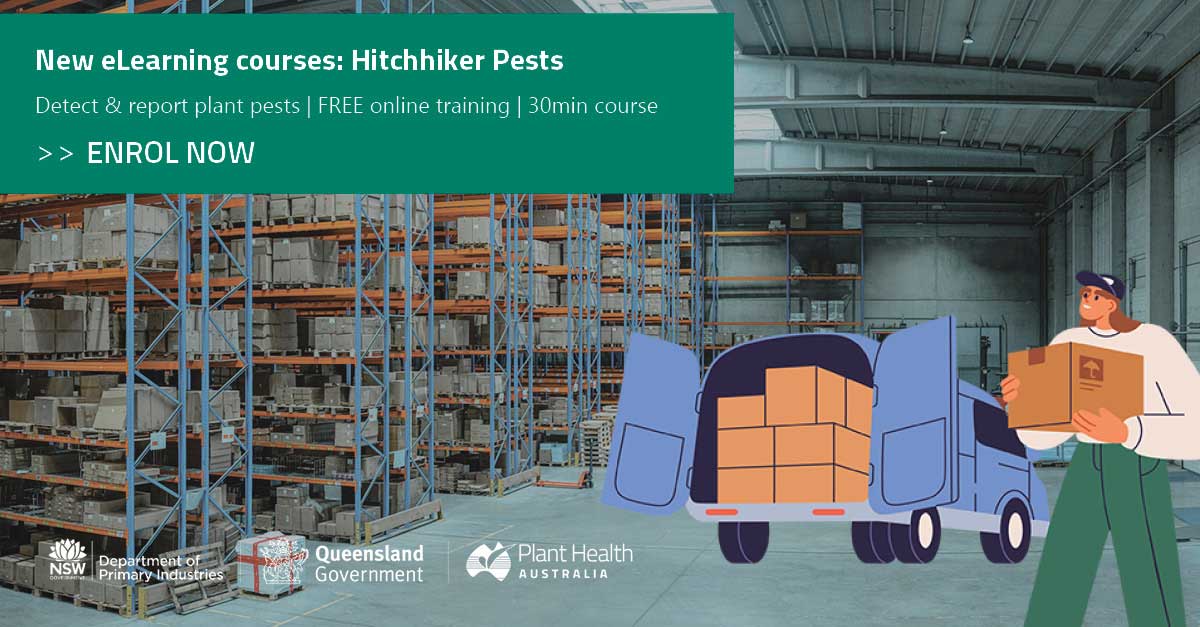Online training supports good jobs in face of hitchhiker pests

New online training packages will support good jobs in agriculture by helping more people recognise exotic pests and diseases.
Minister for Agricultural Industry Development and Fisheries and Minister for Rural Communities Mark Furner said Biosecurity Queensland, Plant Health Australia, and the NSW Government had developed two new online training packages, Hitchhiker Pests, and Nursery Pests and Diseases.
“Increasing global trade and the corresponding movement of pests and diseases means Australians need to be ready to tackle evolving biosecurity risks,” Mr Furner said.
“Hitchhiker pests, as they are known, are pests and weeds that can hitch a ride to Australia in vessels, shipping containers and break-bulk cargo,” Mr Furner said.
“Recent detections of hitchhiker pests such as Khapra beetle in imported goods highlight the importance of recognising incoming threats.
“These pests have the potential for significant impacts including on our environment and way of life.
“The new Hitchhiker Pests online course is aimed at businesses that deal with goods and cargo at critical points along the supply chain, including warehouses, distribution centres, and large retail chains.
“The Nursery Pests and Diseases course is designed for staff at local councils and retail nurseries, landscapers and horticulturalists. The course provides training in pest identification and on the actions to take if staff see a suspected exotic pest or disease on plants.”
Mr Furner said the Palaszczuk Government was excited to have major retailers looking to integrate the training into their staff training to build their core biosecurity awareness.
“We are seeking more companies who are willing to be biosecurity champions and build this awareness within their business to protect Queensland from biosecurity threats,” he said.
“Each course takes about 30 minutes to complete and participants will receive a certificate of completion. Employers can recognise these courses as professional development.”
Plant Health Australia (PHA) Chief Executive Officer Sarah Corcoran said collaboration and partnerships were key elements of a strong, integrated Australian biosecurity system.
“By forming new partnerships and extending our biosecurity training to new areas of the supply chain, we are boosting our collective ability to detect and report suspected pests and diseases,” Ms Corcoran said.
“These new courses will be valuable additions to PHA’s library of free online training courses to enhance plant health knowledge and raise biosecurity awareness.
“Equipping key industries with practical biosecurity training and practices that they can incorporate into their day-to-day tasks not only adds an additional layer to Australia’s biosecurity network but also demonstrates that you don’t need to be an expert to detect and report something unusual.”
Mr Furner said Australia had strong measures to prevent the entry, establishment and spread of pests and diseases.
“However, for the system to be as robust as possible, it needs everyone at all points in the chain to be vigilant and report anything unusual,” Mr Furner said.
“Training staff to be biosecurity aware and making sure everyone knows the reporting process adds an additional weapon to our arsenal.
“I encourage employers to contact Biosecurity Queensland for more information on how to integrate these free courses into their corporate training packages.”
To register for these training packages, visit http://phabolt.com.au/
To report a suspected pest or disease call the Exotic Plant Pest Hotline 1800 084 881.
